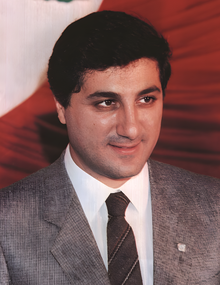Bachir Gemayel | |
|---|---|
بشير الجميّل | |
 Gemayel in 1982 | |
| President-elect of Lebanon[note 1] | |
| In role 23 August 1982 – 14 September 1982 | |
| Prime Minister | Shafik Wazzan |
| Preceded by | Élias Sarkis |
| Succeeded by | Amine Gemayel |
| Commander of the Lebanese Forces | |
| In office 18 January 1976 – 14 September 1982 | |
| Preceded by | Office established |
| Succeeded by | Fadi Frem |
| Personal details | |
| Born | 10 November 1947 Achrafieh, Beirut, Lebanon |
| Died | 14 September 1982 (aged 34) Achrafieh, Beirut, Lebanon |
| Manner of death | Assassination |
| Political party | Kataeb Party |
| Spouse | |
| Relations | Amine Gemayel (brother) |
| Children | Maya Gemayel (1978–1980) Youmna Gemayel Nadim Gemayel |
| Parent(s) | Pierre Gemayel Geneviève Gemayel |
| Education | Saint Joseph University |
| Occupation | Lawyer |
Bachir Pierre Gemayel[note 2] (Arabic: بشير بيار الجميّل, pronounced [baˈʃiːr ʒɪˈmajjɪl]; 10 November 1947 – 14 September 1982) was a Lebanese militia commander who led the Lebanese Forces, the military wing of the Kataeb Party, in the Lebanese Civil War and was elected President of Lebanon in 1982.
He founded and later became the supreme commander of the Lebanese Forces, uniting major Christian militias by force under the slogan of "Uniting the Christian Rifle". Gemayel allied with Israel and his forces fought the Palestine Liberation Organization and the Syrian Army. He was elected president on 23 August 1982, but he was assassinated before taking office on 14 September, via a bomb explosion by Habib Shartouni, a member of the Syrian Social Nationalist Party.[2]
Gemayel is described as the most controversial figure in the history of Lebanon. He remains popular among Maronite Christians, where he is seen as a "martyr" and an "icon". Conversely, he has been criticized for committing alleged war crimes and accused of treason for his relations with Israel.[3][4]
Cite error: There are <ref group=note> tags on this page, but the references will not show without a {{reflist|group=note}} template (see the help page).
- ^ "Gemayel family". Encyclopaedia Britannica. 13 November 2019. Retrieved 24 July 2024.
- ^ "Phalangists Identify Bomber of Gemayel As Lebanese Leftist". The New York Times. Reuters. 3 October 1982. p. 19. ISSN 0362-4331. Retrieved 22 July 2024.
- ^ "بشير الجميل.. الحلم الضائع". Al-Afkar. 5 January 2017. Archived from the original on 31 December 2020. Retrieved 1 December 2020.
- ^ Rami (31 August 2016). "Bachir Gemayel The Series". +961. Retrieved 1 December 2020.